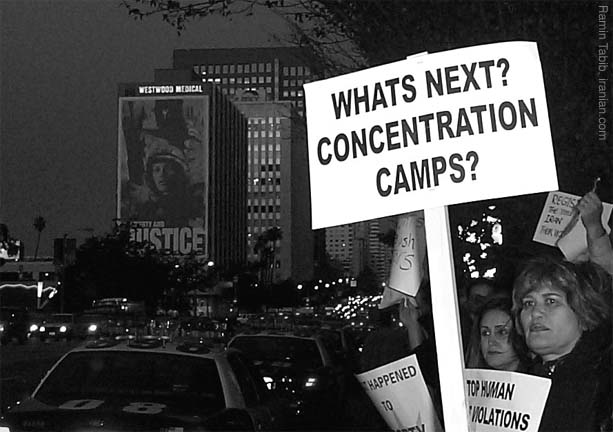Inside the giant billowy white tents, the massive klieg lights glare down from the ceiling all night long. The air is loud with the buzz of generators pumping out power. The post-storm housing — a refugee camp on the grounds of the Monmouth Park racetrack – is in lockdown, with security guards at every door, including the showers.
No one is allowed to go anywhere without showing their I.D. Even to use the bathroom, “you have to show your badge,” said Amber Decamp, a 22-year-old whose rental was washed away in Seaside Heights, New Jersey.
The mini city has no cigarettes, no books, no magazines, no board games, no TVs, and no newspapers or radios. On Friday night, in front of the mess hall, which was serving fried chicken and out-of-the-box, just-add-water potatoes, a child was dancing and dancing — to nothing. “We’re starting to lose it,” said Decamp. “But we have nowhere else to go.”
…
It has taken three days for the tents to get warm.
Power workers from out of state who are helping utilities restore electricity to the area were starting to bed down in the tent city, too. Some empty vodka bottles appeared on the muddy street. There were now far more men than women or children, and the women said it was impossible not to notice the leering of some men.
Brian Skorupski, a manager with Tolland, Connecticut-based Asplundh Line Construction, had just rolled in with 50 workers, who were there to help restore power. Skorupski is used to his house in the suburbs. He missed his king-sized bed with his Hotel Collection sheets. “The only thing worse than this is sleeping in your truck,” he said.
No one is allowed to go anywhere without showing their I.D. Even to use the bathroom, “you have to show your badge,” said Amber Decamp, a 22-year-old whose rental was washed away in Seaside Heights, New Jersey.
The mini city has no cigarettes, no books, no magazines, no board games, no TVs, and no newspapers or radios. On Friday night, in front of the mess hall, which was serving fried chicken and out-of-the-box, just-add-water potatoes, a child was dancing and dancing — to nothing. “We’re starting to lose it,” said Decamp. “But we have nowhere else to go.”
…
It has taken three days for the tents to get warm.
Power workers from out of state who are helping utilities restore electricity to the area were starting to bed down in the tent city, too. Some empty vodka bottles appeared on the muddy street. There were now far more men than women or children, and the women said it was impossible not to notice the leering of some men.
Brian Skorupski, a manager with Tolland, Connecticut-based Asplundh Line Construction, had just rolled in with 50 workers, who were there to help restore power. Skorupski is used to his house in the suburbs. He missed his king-sized bed with his Hotel Collection sheets. “The only thing worse than this is sleeping in your truck,” he said.



No comments:
Post a Comment